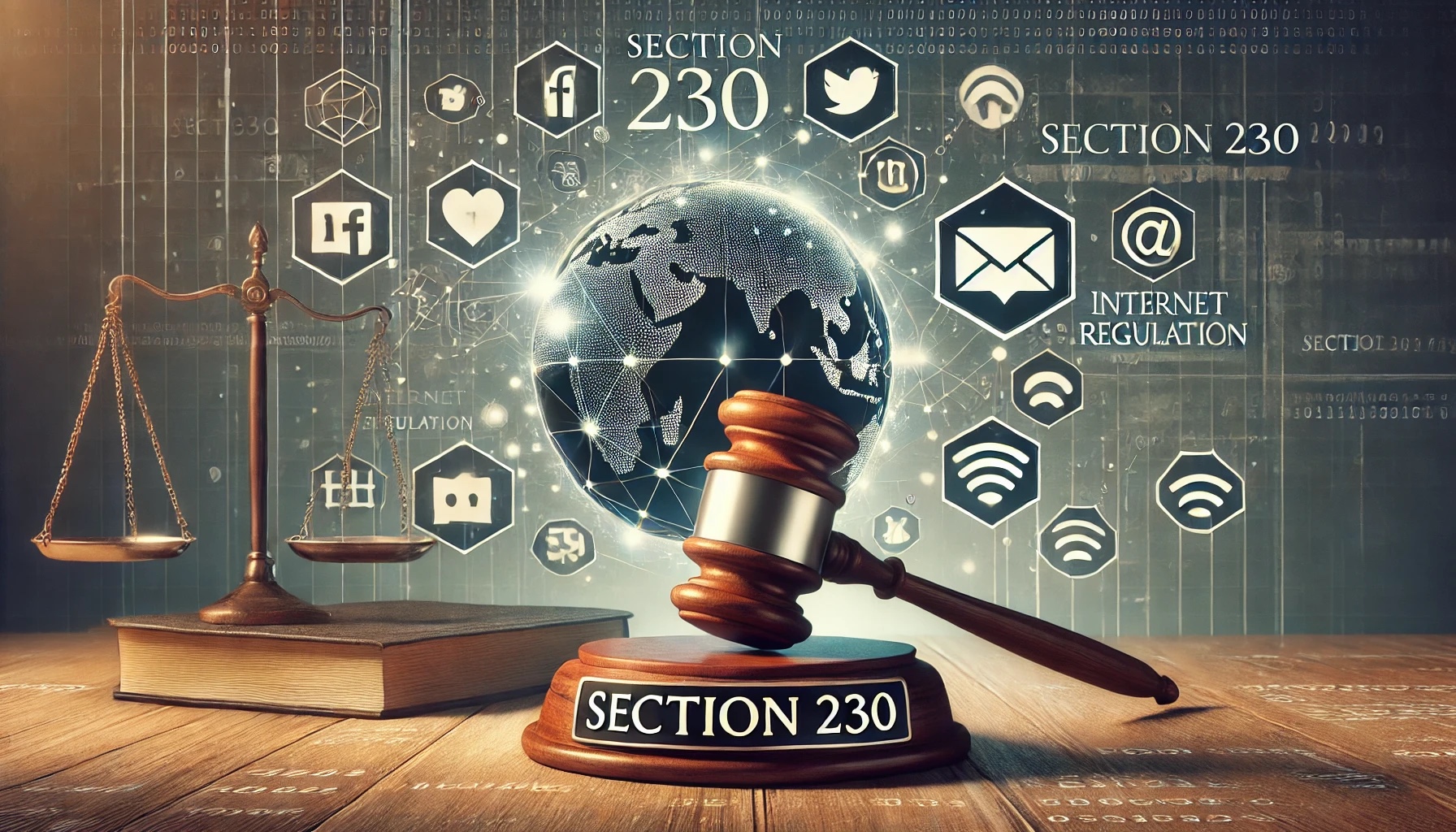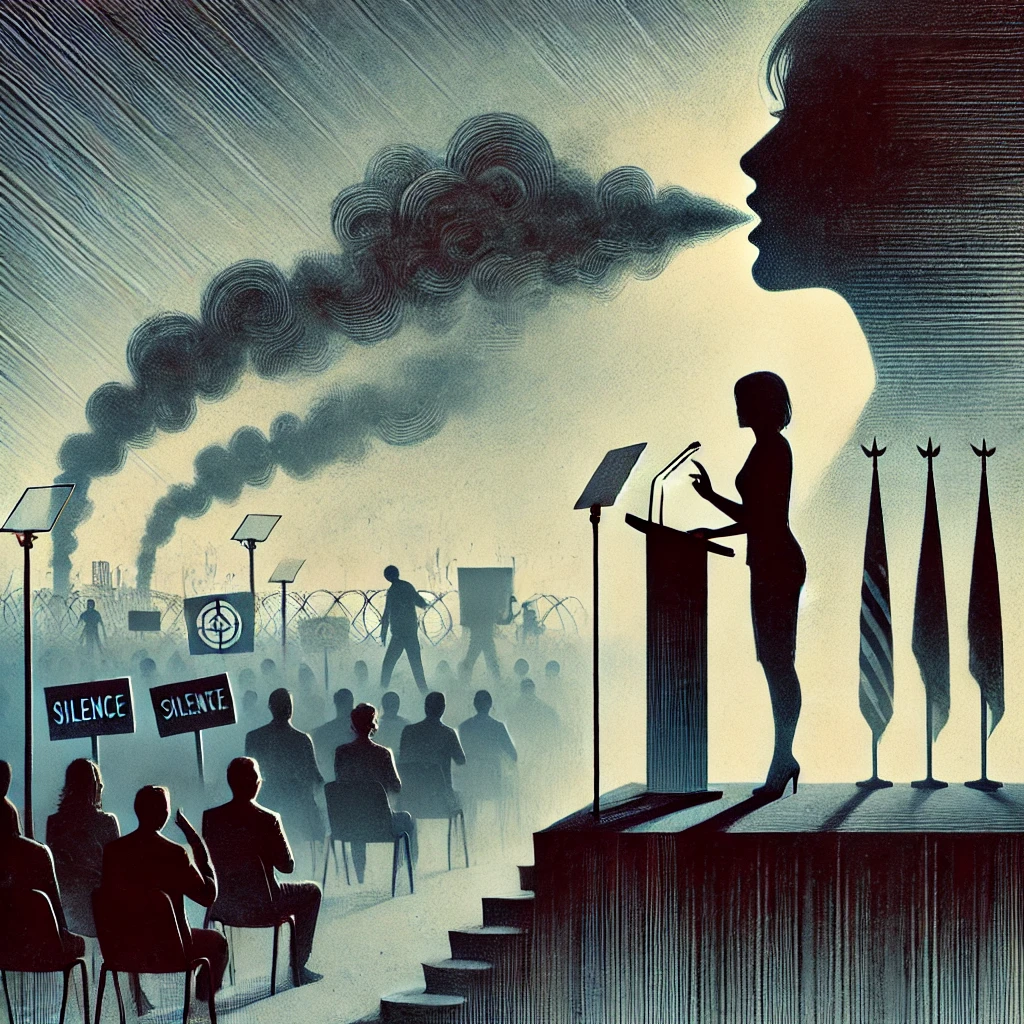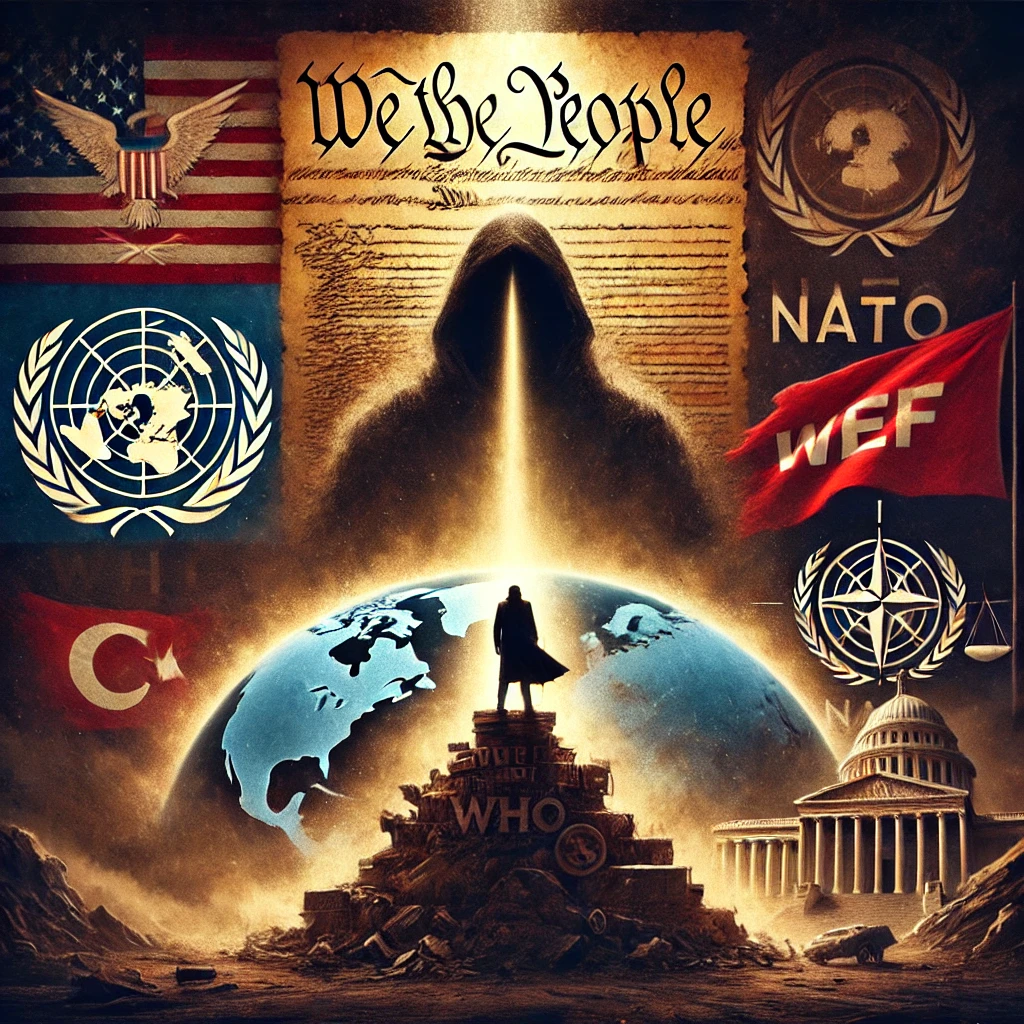In the digital age, social media platforms have become the primary battleground for free speech, political discourse, and the flow of information. At the heart of the debate over content moderation is a provision of U.S. law known as Section 230 of the Communications Decency Act (CDA) of 1996. Section 230 has been credited with enabling the growth of the modern internet by offering platforms legal immunity from content created by users. But in recent years, Section 230 has come under intense scrutiny, with calls for reform from all sides of the political spectrum. Former President Donald Trump and many conservatives have advocated for changing or repealing Section 230, arguing that tech companies engage in biased censorship. On the other hand, many libertarians, particularly those concerned with the growing influence of government over digital platforms, view these calls for reform with suspicion, believing that they would only lead to more government overreach.
This article will explore the origins of Section 230, its role in shaping the current state of online free speech, and the implications of proposed changes from the perspective of a libertarian who values both free speech and limited government. The article will also examine the ways in which government entities, often through organizations like the World Health Organization (WHO), contribute to censorship, and suggest alternative solutions to the problems posed by censorship without giving more power to the state.
The Origins of Section 230
Section 230 of the Communications Decency Act (CDA) was passed as part of the Telecommunications Act of 1996. The internet in the mid-1990s was still in its infancy, and lawmakers were attempting to address a number of issues related to online communication, including the spread of pornography, defamation, and other harmful content. The CDA was originally intended to regulate online content, with a particular focus on obscenity and indecency. However, Section 230 was included as a provision that provided immunity to online platforms, effectively saying that internet service providers (ISPs), websites, and platforms would not be held liable for content posted by third-party users.
Section 230 states:
“No provider or user of an interactive computer service shall be treated as the publisher or speaker of any information provided by another information content provider.”
This seemingly simple provision created a critical distinction between online platforms and traditional media. Whereas newspapers and broadcasters could be held legally liable for content they published, Section 230 ensured that platforms like Facebook, Twitter, YouTube, and others would not be held responsible for user-generated content.
In short, Section 230 allowed the internet to thrive by fostering an environment where online platforms could host user-generated content without fearing constant lawsuits over the words or actions of their users. It enabled the rise of social media, online forums, review sites, and other user-driven platforms. The law has been widely credited with allowing the internet to evolve into the decentralized, dynamic ecosystem it is today.
Section 230 and Its Role in Free Speech
From a libertarian perspective, Section 230 is a critical safeguard for free speech on the internet. It allows platforms to operate without fear of excessive government regulation or litigation, which is especially important in an age when the boundaries of free speech are often contested. Without Section 230, websites would likely be forced to censor a broad range of speech to avoid legal risks, stifling public discourse and innovation.
Libertarians, particularly those concerned with government overreach, view Section 230 as a necessary protection for individual rights. They argue that it creates a safe space for users to express themselves freely online without the threat of platform owners being held liable for everything their users say. The alternative—where platforms are forced to censor content out of fear of lawsuits—would create a chilling effect, where even legitimate expressions of dissent or disagreement could be suppressed.
However, this legal immunity has become a double-edged sword. As social media platforms have grown in influence, the question of how to handle harmful, false, or inflammatory content has become more complex. While Section 230 shields platforms from legal liability, it also grants them enormous power to decide what content remains online and what is removed.
The Growing Problem of Censorship on Social Media
In recent years, social media companies have faced increasing pressure to censor content on their platforms. In some cases, this pressure has come from governments, regulatory bodies, or international organizations like the World Health Organization (WHO), which have called for the removal of misinformation, hate speech, or harmful content. In other cases, platforms have taken it upon themselves to moderate content proactively, often in response to public backlash or concerns about the spread of extremist ideologies, false information, or harassment.
This dynamic has led to concerns that social media platforms are engaging in political censorship. In particular, conservatives and libertarians have raised alarms about the perceived bias of tech giants like Facebook, Twitter, and Google, accusing them of silencing certain political viewpoints, stifling debate, and limiting the range of opinions that can be expressed. The controversy intensified around the 2020 U.S. presidential election, when accusations of bias against conservative voices were amplified by high-profile incidents such as the suspension of Donald Trump’s Twitter account.
Some argue that this censorship is a necessary response to the dangers posed by hate speech, misinformation, and disinformation. However, others believe that it constitutes an infringement on free speech, particularly when such censorship is influenced by government or political pressures. From a libertarian viewpoint, the issue is not just one of platform moderation, but the broader question of who has the authority to regulate speech in the first place.
The Dangerous Role of Government in Censorship
One of the most significant concerns for libertarians is the growing role of government and international bodies in shaping the content moderation policies of private platforms. While Section 230 provides platforms with legal immunity, it is clear that government entities are increasingly attempting to influence the policies of companies like Facebook, Twitter, and YouTube. This is especially true in the context of the COVID-19 pandemic, where organizations like the World Health Organization (WHO) and the Centers for Disease Control and Prevention (CDC) have pushed for the removal of content they deem as misinformation.
In some cases, the government has even been accused of pressuring tech companies to censor specific viewpoints. During the COVID-19 pandemic, for instance, the U.S. government pushed social media companies to remove content that contradicted official public health narratives, such as claims about vaccine safety or alternative treatments. While such actions may be justified on public health grounds, they also raise concerns about government overreach and the potential for state-sanctioned censorship of dissenting voices.
Additionally, the increasing collaboration between social media companies and government agencies raises questions about the independence of these platforms. If the government has the power to dictate what content is allowed online, it could effectively control the flow of information, suppress political opposition, and curtail the free exchange of ideas.
For libertarians, the central issue is not whether platforms should moderate harmful content, but rather who should have the authority to regulate speech. Allowing the government to play an active role in content moderation could lead to the erosion of individual liberties, particularly if the government uses its power to silence voices it deems undesirable.
Trump’s Calls for Section 230 Reform: A Solution or a Trap?
Former President Donald Trump has been a vocal critic of Section 230, particularly in the wake of his social media bans and the controversy surrounding the 2020 election. Trump and many of his supporters argue that Section 230 has allowed tech companies to engage in censorship without consequence. They believe that reforming or repealing Section 230 would hold platforms accountable and prevent them from unfairly censoring conservative voices.
However, from a libertarian perspective, Trump’s calls for reform could be a dangerous precedent. While the motivation to curb censorship is understandable, removing Section 230 or altering its protections could open the door to greater government involvement in regulating online content. Repealing Section 230 would leave platforms vulnerable to lawsuits, and in an environment where government agencies already exert significant influence over tech companies, this could lead to more, not less, censorship.
Moreover, even if Section 230 were reformed to address concerns about bias and censorship, any changes to the law could pave the way for further government intervention in the digital space. This would be a step toward centralizing control over speech, leaving the government as the ultimate arbiter of what is acceptable online. This is a particularly troubling scenario for libertarians, who believe that the government should have as little involvement in regulating speech as possible.
Alternative Solutions to Combat Censorship Without Expanding Government Power
Rather than reforming or repealing Section 230, libertarians advocate for alternative solutions that protect free speech and limit government control. These solutions focus on preserving the decentralized nature of the internet, reducing government interference, and promoting competition in the marketplace of ideas.
- Decentralized Platforms:
One potential solution is the development of decentralized social media platforms that are not reliant on a single corporation or government for content moderation. Decentralized platforms, such as those built on blockchain technology, could allow users to control their own data and content without the need for a central authority to moderate posts. This would reduce the risk of censorship, as there would be no central body with the power to remove or restrict content. - Transparency and Accountability:
Another important step is increasing transparency and accountability in content moderation. Platforms should provide clear and publicly available guidelines about their content moderation policies and how decisions are made. This would help users understand why certain content is removed or flagged and provide a more transparent mechanism for appealing moderation decisions. - Public Pressure and Market Forces:
Instead of relying on government regulation, market forces and public pressure can be used to address censorship concerns. If users are dissatisfied with the content moderation policies of a particular platform, they can choose to migrate to alternative platforms that align with their values. This competition can incentivize platforms to adopt more open and balanced content moderation policies, as users will gravitate toward platforms that respect free speech. - Educating Users:
Finally, empowering users to engage critically with information and make informed decisions is a key part of combating misinformation without resorting to censorship. Instead of removing content, platforms should prioritize educational initiatives that promote media literacy and help users distinguish between credible and misleading information.
Conclusion: A Libertarian Perspective on Section 230 and Censorship
Section 230 of the Communications Decency Act has played a vital role in protecting free speech on the internet by shielding platforms from legal liability for user-generated content. However, as the digital landscape has evolved, concerns about censorship, government influence, and the concentration of power in the hands of a few tech companies have grown. While some, including former President Trump, have called for reforming Section 230 to address these issues, libertarians are wary of any changes that would grant the government more power to regulate online content.
The core concern is that increasing government involvement in content moderation could lead to more censorship, not less. Libertarians argue that the best way to address censorship is to promote transparency, competition, and decentralization, rather than empowering the state to regulate speech. Ultimately, the goal should be to preserve the internet as a space where free expression can thrive, without fear of government interference or corporate overreach. By fostering alternatives and creating a marketplace of ideas, we can create a more open and resilient digital ecosystem that respects the fundamental rights of individuals.
Sources:
- Legal Foundations of Section 230:
- Communications Decency Act (1996), specifically Section 230. Full text available from the U.S. Government Publishing Office (GPO).
- Zeran v. America Online, Inc. 129 F.3d 327 (4th Cir. 1997). This landmark case helped establish the legal precedent for the interpretation of Section 230.
- Section 230 and Its Impact on Internet Growth:
- “The Law of the Internet” by Eric Goldman (Various articles and legal commentaries). Goldman is a key figure in legal scholarship about Section 230 and its impact on internet platforms.
- Electronic Frontier Foundation (EFF) — Section 230: The Law That Keeps the Internet Open and Innovative: The EFF has written extensively about Section 230’s protection of free speech and its role in the growth of the internet.
- “Why We Need Section 230” — A position paper by the Electronic Frontier Foundation, defending Section 230 as a critical law for free expression on the internet. EFF Article
- Censorship Concerns and the Role of Tech Companies:
- “The Censorship of Social Media and the Modern Internet”, by Tom Fitton (2020). Fitton’s writings, particularly with Judicial Watch, examine how platforms like Facebook, Twitter, and YouTube moderate content.
- Pew Research Center – Public Attitudes Toward Social Media and Content Moderation: A study that examines public perceptions of bias and content moderation on social media platforms.
- “The First Amendment in the Digital Age” by Jack Balkin (Yale University Press, 2018). Balkin’s analysis of free speech and regulation of social media is important for understanding the tension between private platforms and government influence.
- The Role of Government and International Organizations in Censorship:
- World Health Organization (WHO) and Content Moderation: Reports and guidance from the WHO about controlling misinformation around health topics, especially in relation to COVID-19. For example, WHO’s position on combating misinformation during the pandemic. WHO website
- “Misinformation, Conspiracy Theories, and the COVID-19 Pandemic: The Role of Social Media” by Holly L. O’Hara (2020). This article reviews the role of social media in the spread of misinformation and the pressures from governments and health organizations to regulate it.
- “How Governments Around the World Are Pressuring Social Media Companies to Censor Content” (2021). This analysis from The Atlantic discusses various governments’ requests and even legal actions taken to pressure tech companies to moderate content.
- Trump’s Calls for Section 230 Reform:
- “Trump Signs Executive Order Targeting Social Media Companies” (The New York Times, May 28, 2020). This executive order, aimed at modifying Section 230, is a primary source for understanding Trump’s position on content moderation and tech censorship.
- “Trump’s War on Section 230: What’s at Stake?” (Brookings Institution, 2020). Brookings explores the implications of Trump’s stance and executive orders regarding Section 230 and content moderation.
- Libertarian Perspectives on Free Speech and Government Overreach:
- “Why Government Should Not Regulate Speech” by Cato Institute. This publication from a leading libertarian think tank argues against the regulation of speech by both government and large tech companies, discussing the importance of protecting free expression on the internet.
- “The Tyranny of the Majority: How the Left and Right Both Seek to Restrict Free Speech” by George F. Will (Washington Post, 2020). Will, a conservative commentator with libertarian leanings, provides insight into the dangers of government involvement in regulating speech and the potential unintended consequences of censorship policies.
- Decentralized Alternatives to Centralized Platforms:
- “Blockchain and the Future of Free Speech: Decentralized Platforms”, a paper published by the Mercatus Center at George Mason University. This paper explores how decentralized technologies, particularly blockchain, could offer an alternative to censorship on centralized platforms.
- “How Decentralized Social Media Could Prevent Censorship” by Matthew Feeney (Cato Institute). Feeney discusses the potential for decentralized platforms to reduce the censorship power of tech companies and the government. Cato Institute.
- Transparency and Accountability in Content Moderation:
- “Twitter’s Content Moderation: A Case Study” (Harvard Law Review, 2020). This academic paper explores how platforms like Twitter handle content moderation, the legal challenges they face, and how transparency can help mitigate concerns of bias.
- “Big Tech and the Future of Free Speech” by Robert W. McChesney (Chicago Tribune, 2020). McChesney provides an in-depth look at the challenges posed by the dominance of big tech platforms and how transparency could serve as a solution.
- Market Forces and Public Pressure on Social Media Platforms:
- “How Public Pressure and Competition are Changing Tech” (The Wall Street Journal, 2021). This article examines how public pressure, consumer demand, and market competition have led to shifts in social media policies and business models, particularly regarding content moderation.
- “The Economics of Censorship and Speech on the Internet” by Lawrence Lessig (Harvard Law School, 2019). Lessig discusses how economic incentives, rather than government regulation, can influence platforms to provide more balanced moderation.
- Media Literacy and Empowering Users:
- “How Media Literacy Can Combat Misinformation” by The Media Education Lab (University of Rhode Island). The article discusses how promoting media literacy can help users critically engage with online content and reduce the impact of harmful misinformation without censorship.
- “Civic Media: Technology, Design, and Practice” by P. L. L. Jenkins et al. (MIT Press, 2016). This book explores how education and civic engagement can promote a healthier online discourse without heavy-handed content moderation.


